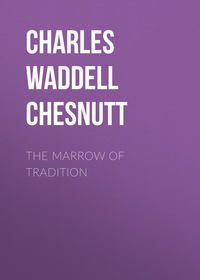 полная версия
полная версияThe Wife of his Youth and Other Stories of the Color Line, and Selected Essays
What colored men of the South can do to secure their citizenship to-day, or in the immediate future, is not very clear. Their utterances on political questions, unless they be to concede away the political rights of their race, or to soothe the consciences of white men by suggesting that the problem is insoluble except by some slow remedial process which will become effectual only in the distant future, are received with scant respect—could scarcely, indeed, be otherwise received, without a voting constituency to back them up,—and must be cautiously made, lest they meet an actively hostile reception. But there are many colored men at the North, where their civil and political rights in the main are respected. There every honest man has a vote, which he may freely cast, and which is reasonably sure to be fairly counted. When this race develops a sufficient power of combination, under adequate leadership,—and there are signs already that this time is near at hand,—the Northern vote can be wielded irresistibly for the defense of the rights of their Southern brethren.
In the meantime the Northern colored men have the right of free speech, and they should never cease to demand their rights, to clamor for them, to guard them jealously, and insistently to invoke law and public sentiment to maintain them. He who would be free must learn to protect his freedom.
Eternal vigilance is the price of liberty. He who would be respected must respect himself. The best friend of the Negro is he who would rather see, within the borders of this republic one million free citizens of that race, equal before the law, than ten million cringing serfs existing by a contemptuous sufferance. A race that is willing to survive upon any other terms is scarcely worthy of consideration.
The direct remedy for the disfranchisement of the Negro lies through political action. One scarcely sees the philosophy of distinguishing between a civil and a political right. But the Supreme Court has recognized this distinction and has designated Congress as the power to right a political wrong. The Fifteenth Amendment gives Congress power to enforce its provisions. The power would seem to be inherent in government itself; but anticipating that the enforcement of the Amendment might involve difficulty, they made the supererogatory declaration. Moreover, they went further, and passed laws by which they provided for such enforcement. These the Supreme Court has so far declared insufficient. It is for Congress to make more laws. It is for colored men and for white men who are not content to see the blood-bought results of the Civil War nullified, to urge and direct public opinion to the point where it will demand stringent legislation to enforce the Fourteenth and Fifteenth Amendments. This demand will rest in law, in morals and in true statesmanship; no difficulties attending it could be worse than the present ignoble attitude of the Nation toward its own laws and its own ideals—without courage to enforce them, without conscience to change them, the United States presents the spectacle of a Nation drifting aimlessly, so far as this vital, National problem is concerned, upon the sea of irresolution, toward the maelstrom of anarchy.
The right of Congress, under the Fourteenth Amendment, to reduce Southern representation can hardly be disputed. But Congress has a simpler and more direct method to accomplish the same end. It is the sole judge of the qualifications of its own members, and the sole judge of whether any member presenting his credentials has met those qualifications. It can refuse to seat any member who comes from a district where voters have been disfranchised; it can judge for itself whether this has been done, and there is no appeal from its decision.
If, when it has passed a law, any Court shall refuse to obey its behests, it can impeach the judges. If any president refuse to lend the executive arm of the government to the enforcement of the law, it can impeach the president. No such extreme measures are likely to be necessary for the enforcement of the Fourteenth and Fifteenth Amendments—and the Thirteenth, which is also threatened—but they are mentioned as showing that Congress is supreme; and Congress proceeds, the House directly, the Senate indirectly, from the people and is governed by public opinion. If the reduction of Southern representation were to be regarded in the light of a bargain by which the Fifteenth Amendment was surrendered, then it might prove fatal to liberty. If it be inflicted as a punishment and a warning, to be followed by more drastic measures if not sufficient, it would serve a useful purpose. The Fifteenth Amendment declares that the right to vote shall not be denied or abridged on account of color; and any measure adopted by Congress should look to that end. Only as the power to injure the Negro in Congress is reduced thereby, would a reduction of representation protect the Negro; without other measures it would still leave him in the hands of the Southern whites, who could safely be trusted to make him pay for their humiliation.
Finally, there is, somewhere in the Universe a "Power that works for righteousness," and that leads men to do justice to one another. To this power, working upon the hearts and consciences of men, the Negro can always appeal. He has the right upon his side, and in the end the right will prevail. The Negro will, in time, attain to full manhood and citizenship throughout the United States. No better guaranty of this is needed than a comparison of his present with his past. Toward this he must do his part, as lies within his power and his opportunity. But it will be, after all, largely a white man's conflict, fought out in the forum of the public conscience. The Negro, though eager enough when opportunity offered, had comparatively little to do with the abolition of slavery, which was a vastly more formidable task than will be the enforcement of the Fifteenth Amendment.
The Negro Problem, 1903






